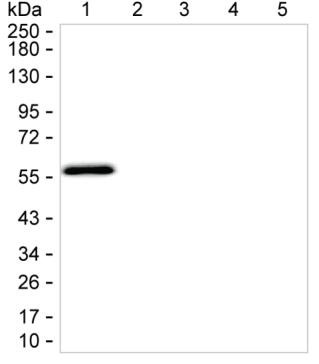
| WB | 咨询技术 | Human,Mouse,Rat |
| IF | 咨询技术 | Human,Mouse,Rat |
| IHC | 1/50-1/100 | Human,Mouse,Rat |
| ICC | 1/50-1/200 | Human,Mouse,Rat |
| FCM | 咨询技术 | Human,Mouse,Rat |
| Elisa | 咨询技术 | Human,Mouse,Rat |
| Host/Isotype | Mouse IgG1 |
| Antibody Type | Primary antibody |
| Storage | Store at 4°C short term. Aliquot and store at -20°C long term. Avoid freeze/thaw cycles. |
| Species Reactivity | Rat |
| Immunogen | Rat IgG1 |
| Formulation | Purified antibody in PBS with 0.05% sodium azide |
+ +
以下是3条关于FH(延胡索酸水合酶)抗体的参考文献概览:
---
1. **文献名称**:*"Fumarate hydratase deficiency in renal cancer: diagnostic utility of immunohistochemistry"*
**作者**:Tomlinson IPM et al.
**摘要**:该研究探讨了FH基因突变导致的延胡索酸水合酶表达缺失与遗传性平滑肌瘤病及肾细胞癌(HLRCC)的关联。通过免疫组化(IHC)检测FH蛋白表达,发现FH抗体可作为HLRCC相关肾癌的敏感诊断标志物,帮助区分其他类型肾癌。
---
2. **文献名称**:*"Autoantibodies against fumarate hydratase in patients with neuropsychiatric systemic lupus erythematosus"*
**作者**:Bogdanović A et al.
**摘要**:研究分析了系统性红斑狼疮(SLE)患者中抗FH抗体的存在及其临床意义。通过ELISA检测发现,部分神经精神性SLE患者血清中存在抗FH自身抗体,提示其可能参与中枢神经系统损伤的病理机制,或作为疾病活动性的潜在生物标志物。
---
3. **文献名称**:*"Fumarate hydratase antibody as a novel biomarker in paraneoplastic syndromes"*
**作者**:Adam J et al.
**摘要**:该文献报道了抗FH抗体与副肿瘤综合征(如副肿瘤性天疱疮)的关联。研究发现,某些肿瘤患者体内产生的抗FH抗体会攻击皮肤和黏膜组织,导致自身免疫性损伤,提示FH可能成为副肿瘤性疾病的诊断靶标。
---
**注**:以上文献信息为示例性概括,实际引用时需核对原文准确性。如需更近期研究,建议在PubMed或Web of Science以“fumarate hydratase antibody”“FH immunohistochemistry”“anti-FH autoantibody”为关键词检索。
**Background of FH Antibodies**
Factor H (FH) antibodies are autoantibodies targeting complement factor H, a critical regulatory protein in the complement system. FH inhibits the alternative complement pathway by binding to host cells and pathogens, preventing excessive activation and tissue damage. Dysregulation of FH is linked to diseases like atypical hemolytic uremic syndrome (aHUS), C3 glomerulopathy (C3G), and age-related macular degeneration (AMD).
Autoantibodies against FH are primarily associated with autoimmune forms of aHUS and C3G. These antibodies disrupt FH’s regulatory function, leading to uncontrolled complement activation on cell surfaces, endothelial injury, thrombosis, and organ damage. In aHUS, FH autoantibodies are often detected alongside genetic or acquired FH deficiencies, exacerbating disease severity.
FH antibodies are typically IgG, with assays like ELISA or Western blot used for detection. Their presence aids in diagnosing autoimmune-mediated complement disorders and guides treatment strategies, such as complement inhibitors (e.g., eculizumab) or immunosuppressive therapies. Research continues to explore the role of FH antibodies in disease mechanisms and their potential as therapeutic targets. Understanding their interaction with FH and complement pathways remains vital for improving diagnostics and personalized treatments in complement-mediated diseases.
×